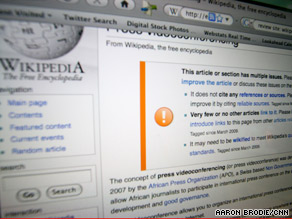Wikipedia: No longer the Wild West? - CNN.com
CNN) -- Today's Internet is governed by the idea that crowds of people can create the news, share information and collaborate on online projects.
So when Wikipedia, the user-written encyclopedia that's built an empire on this ideal, decided this week to add a layer of oversight to its system, the Web erupted in debate.
The popular encyclopedia, which has drawn criticism for inaccuracies, says it will try assigning editors to some of its entries. These trusted volunteers likely would have to approve public edits before they're published to English-language stories about living people.
Some see the move as a shift away from Wikipedia's core values and a sign that crowds of people aren't able to produce a usable and accurate body of information.
Others see the change as a sign that these communities of online volunteers are getting more complex and they may need more rules.
Since Wikipedia was founded in 2001, a number of sites have popped up employing its basic philosophy that users can control the content of the Web.
